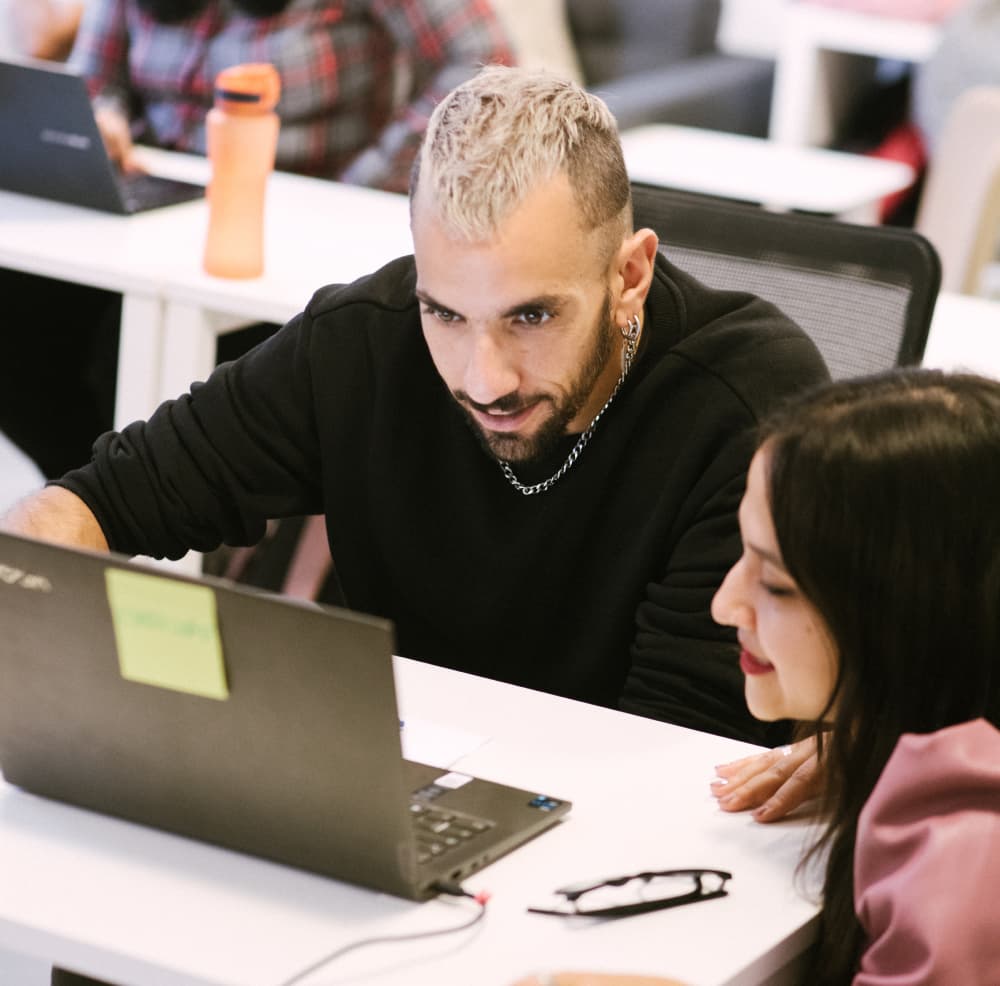Curriculum at a glance
The most up-to-date, effective tech stack on the market:
Build your own app: Dive deep into back-end processes with Java and JavaScript and learn everything about databases, authentication, security, and more in our Java Development Bootcamp.



Invent your own app: Get deep into back-end processes with Java and JavaScript and learn all about databases, authentication, security & Co in the Java Development Bootcamp.
What you'll learn at our Java Bootcamp
Let's go - let's code! In the first two weeks of our Java programming course we teach you the basics of programming.The programming language we use is the object-oriented language Java - probably the most widely used coding language in the world.
In some hands-on exercises you will learn how to write extensible and clean code, and how to version and test perfectly. You will use the latest and hottest tools to support you. Our coaches will show you in detail how they work in the Java course.
In the second phase of your Java developer training, everything revolves around the popular "Spring Framework", with the help of which you can run your first own server. Spring Framework is an open-source framework that is compatible with the Java platform and is often used in web applications.You will define your own APIs (Application Programming Interfaces) and of course, write tests for them.
Next, you'll cover the frontend in the Java course. Makes sense, because only if you master the frontend fundamentals, your application can be operated in a user-friendly way. And here's another new topic: After learning the HTML, CSS and JS basics, we'll start right away with the React Library.
It's perfect for creating user interface components just the way you want them. React is probably the most effective solution for making modular front-end components portable, reusable, and interactive. A super tool that no Java developer can do without.
Now we put the pieces of the puzzle together: In the fourth phase of your Java training, we connect our backend with our frontend and make sure that everything meshes smoothly. And if there should be a hitch in the communication between frontend and backend, we make sure that our application remains fully functional.
In the penultimate phase, we take our application to an even higher level. With the help of databases we persist our data, with the help of Docker and Heroku we publish our application on the web. Learning Java with security: To control who can use our application and how, we secure it with Spring Security, a Java framework that provides authentication, authorization, and other security features for enterprise applications.
Only through practice can you become a Java developer. That's why you're now writing your own app, the topic or idea of which you come up with yourself. Our coaches will of course support you in the planning and implementation of your digital capstone project, for which you have four weeks.
If you're interested in our further training and would like to learn more before you begin, please feel free to attend one of our information sessions and see which topic is right for you.

The most up-to-date, effective tech stack on the market:
Learn the core principles of Java – from variables and control structures to object-oriented programming.
Deepen your knowledge with complex concepts like inheritance, interfaces, and clean code principles.
Work with relational databases (e.g., PostgreSQL) and build server-side applications using Spring Boot.
Learn how to test your applications (e.g., with JUnit) and deploy them securely – including CI/CD pipelines.
Put your skills to use by developing your own app – from idea to implementation. Our coaches will guide you through the four-week project phase, during which you’ll plan, build, and present your digital masterpiece at the graduation event.

What good are skills without getting a foot in the door? We focus extensively on helping you ace real world technical interviews.
We believe that development is continuous, so we offer up-to-date career coaching sessions to help you progress professionally.
Changing careers is more than learning new tech skills. We additionally provide you with spot on soft skills to ace your application process.
Wondering ‘what’s next’? We're connected with exciting startups and companies in Germany.
7,000 alumni have already completed a final project with us. You too will complete one that you can present to your future employers. Discover which projects already exist.

Head of Java & Web Development

Head of Java & Web Development
Spicedlings are getting hired by your favourite companies:
Invest in your future
If you’re registered as unemployed (or soon to be) in Germany, you could be eligible to have all your costs covered with a Bildungsgutschein (training voucher).
For more information on this option, check our page dedicated to financing your coding bootcamp with a Bildungsgutschein.
We want to make our best-in-class tech courses available to everyone with the motivation to complete them.
Our Deferred Payment Option enables those who aren’t in the position to pay upfront nor in instalments to participate, by offering the chance to pay back at a later date.
If you’re ready to cover the cost of our coding bootcamps immediately, this is the option for you. Pay 14 days before the course starts.
12 Weeks | Full-time
Who is the Java Bootcamp for?
Our bootcamp is the IT training program for aspiring Java developers – whether you're a career changer or already have professional experience. Anyone who is motivated to learn something new, interested in IT, and eager for a job change can become a Java developer. Career changers, as well as former service members, are in exactly the right place here. Ideally, you already have some programming experience – we’ll clarify the details with you in our introductory call.
What will I learn in the Java course?
Learning to code with Java is comprehensive and fun! Our Java course teaches you object-oriented programming (OOP), how to write clean and scalable Java code, and how CSS, JavaScript, and HTML work together — backend and frontend. You'll also learn everything about APIs, modern frameworks, libraries, and databases. On top of that, you’ll gain skills in hosting and DevOps to kick off your career as a Java developer.
Which jobs can I pursue after the bootcamp?
Folgende Berufe stehen dir nach dem Bootcamp zur Verfügung: Java Developer, Java Backend Developer, Java Full Stack Developer.
What are the job prospects after the Java Bootcamp?
Learning Java programming makes more sense than ever! German companies are desperately looking for skilled professionals. Especially large corporations are accelerating their digital transformation using Java, the programming language developed by Oracle. A university degree or distance-learning course in computer science is no longer the only way in — recruiters from both large corporations and startups are increasingly looking for team players who are motivated, quick to learn, and ready to hit the ground running without extensive onboarding.
I’ve never done a coding course before — is the Java Bootcamp still suitable for me, or do I need prior programming knowledge?
This is one of the most common concerns for beginners, and the good news is that the {{Java Bootcamp}} was designed with both first-timers and career changers in mind. You don’t need to have a computer science degree or years of coding under your belt to join. What you do need is:
If you’re totally new, don’t worry — the program usually starts with f__undamentals of Java syntax__, simple input/output exercises, and building up gradually toward more advanced topics like object-oriented programming (OOP), databases, and frameworks like Spring Boot. Many past participants who started with zero coding experience now work as Junior Java Developers, QA Engineers, or Software Testers.
💡 Tip: If you’re nervous about the start, try a free online Java basics tutorial before joining. That way, you’ll already feel comfortable with concepts like “variables,” “loops,” or “if-statements” when the bootcamp begins.
If I don’t live in a major city, is it still possible to attend the Java Bootcamp and succeed?
Absolutely 👍 One of the biggest shifts in recent years is the rise of fully remote bootcamps, which means you don’t need to relocate to participate. Many providers now offer:
The main thing you’ll need is a stable internet connection and a computer with at least 8 GB RAM for running development environments like IntelliJ IDEA or Eclipse.
💡 Pro tip: If you’re in Germany and want funding via Kursnet vouchers, you’ll find many providers are officially certified and allow you to do the entire training remotely — so you can stay in your hometown but still have the costs fully covered.
Email address
I would like to receive email updates from SPICED Academy. This decision can be revoked at any time. Information on how we handle your data can be found in our privacy policy.